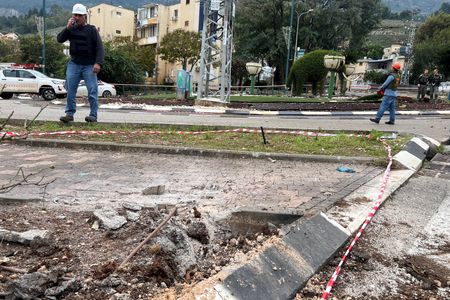BEIRUT (Reuters) -Hezbollah said on Thursday it fired dozens of rockets at a northern Israeli town in a “preliminary response” to the killing of 10 civilians in southern Lebanon, the deadliest day for Lebanese civilians in four months of cross-border hostilities.
The United Nations urged a halt to what it called a “dangerous escalation” of the conflict, which has played out in parallel to the Gaza war and fuelled concerns of a wider confrontation between the Iran-backed Hezbollah and Israel.
The Israeli military said it had killed a commander in Hezbollah’s elite Radwan unit, his commander and another operative in a “precise airstrike” in Nabatieh in Lebannon on Wednesday, without mentioning the civilian deaths.
Hezbollah said three of its fighters had been killed on Wednesday and later confirmed that among them was Ali al-Debs, a commander in the Radwan unit.
Seven of the civilians were killed in Nabatieh late on Wednesday when a rare Israeli strike on the southern city hit a multi-storey building, sources in Lebanon said. The dead were from the same extended family and included three children.
It followed an earlier attack on the village of al-Sawana at the border that killed a woman and two children who were buried on Thursday.
The bodies of the children, wrapped in green shrouds, were so small they each fit on two plastic chairs as people came to pay respects. Their father held them tight before they were buried as another man sobbed on his shoulder.
“The enemy will pay the price for these crimes,” Hezbollah politician Hassan Fadlallah told Reuters, saying Hezbollah had a “legitimate right to defend its people”.
A source familiar with Hezbollah thinking said the attack on Nabatieh marked an escalation but was still within unwritten “rules of engagement” by which much of the violence has been contained near the border.
Mohanad Hage Ali, of the Beirut-based Carnegie Middle East Center, said that while Israel appeared to be “testing the limits” of those rules of engagement, Hezbollah was signalling it “wants to keep this as confined as possible”.
Israeli government spokesperson Avi Hyman said Israel’s “message to Hezbollah has been and always will be: ‘Don’t try us’. As Defence Minister Gallant said at the beginning of the war, we will copy and paste what we’ve done in Gaza to Hamas, in Lebanon,” he said.
BORDER CLASHES
Both sides have said they do not seek all-out war.
Israel said Wednesday it was responding to rocket fire from Lebanon that killed one of its soldiers and wounded eight others in Safed, about 15 km (10 miles), from the border.
Hezbollah did not declare responsibility for that attack.
Asked about the Nabatieh strike, a spokesperson for the Israeli military said it was waiting for further information.
“Hezbollah has gone up by half-a-click, we have gone up by one step – but that is one step out of 10,” said Israeli Defence Minister Yoav Gallant, briefing authorities conducting a war-preparedness drill on the Lebanese and Syrian fronts.
Gallant said the military did not seek war but wanted Israeli citizens displaced from the north to return home “under a process of accords” or, if there is no other choice, through “action”.
Israel said it had hit dozens of Hezbollah targets across the south on Thursday. Sirens sounded in northern Israel on Thursday and Israeli medics and police said several rockets struck Kiryat Shmona in Israel, causing damage. There was no immediate word of casualties.
Hezbollah said on Thursday it had struck Kiryat Shmona with dozens of rockets in a preliminary response to the killings in Nabatieh and Sawana. It also announced five of its fighters had been killed in Thursday’s strikes.
Strikes on dense urban areas far from the border, like those on Nabatieh on Wednesday, are considered rare.
Andrea Tenenti, spokesman for UNIFIL, the U.N.’s peacekeeping force in Lebanon, said it had noted a “concerning shift in the exchanges of fire, including targeting of areas far from the Blue Line” – the current demarcation between the countries.
Hezbollah has been waging near daily attacks on Israeli targets at the border since its Palestinian ally Hamas stormed Israel from Gaza on Oct. 7, killing 1,200 people and abducting some 250, according to Israeli tallies.
Hezbollah has said its campaign will stop only when Israel halts its offensive on the Gaza Strip, where more than 28,000 people have been killed according to health authorities in Hamas-run Gaza.
The violence has killed more than 200 people in Lebanon, including more than 170 Hezbollah fighters, as well as around a dozen Israeli troops and five Israeli civilians, as well as uprooting tens of thousands on both sides.
(Reporting by Laila Bassam and Maya Gebeily in Beirut; Additional reporting by James Mackenzie, Dan Williams and Henriette Chacar in Jerusalem; Writing by Tom Perry and Maya Gebeily; Editing by Miral Fahmy, Timothy Heritage, William Maclean and Cynthia Osterman)


